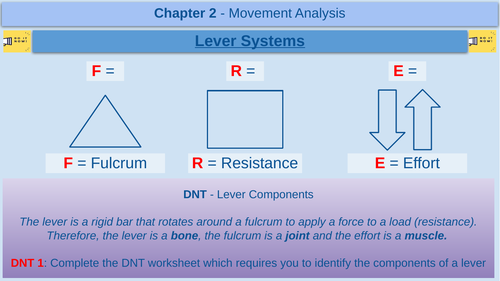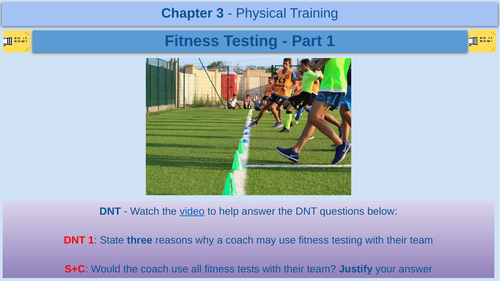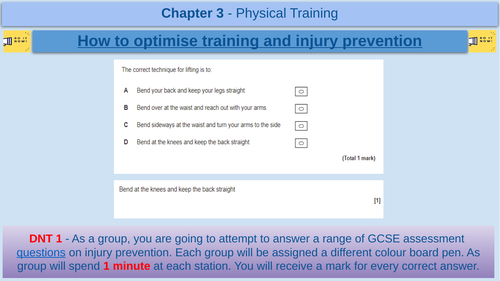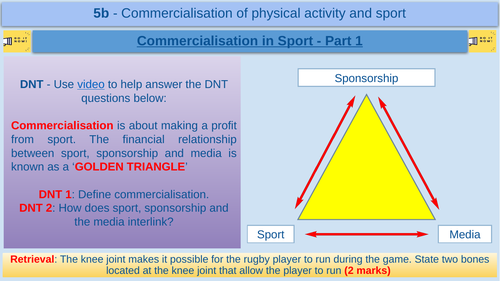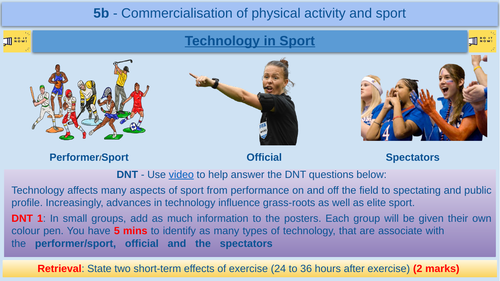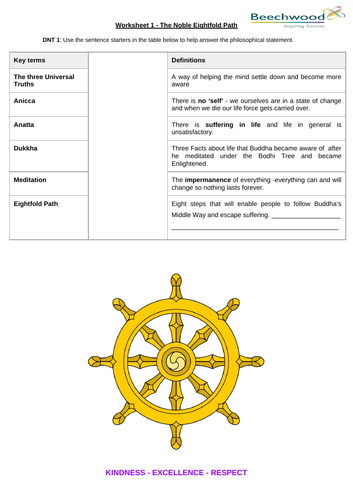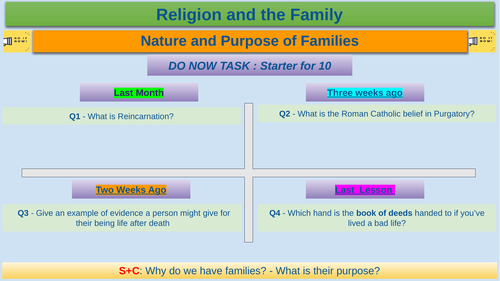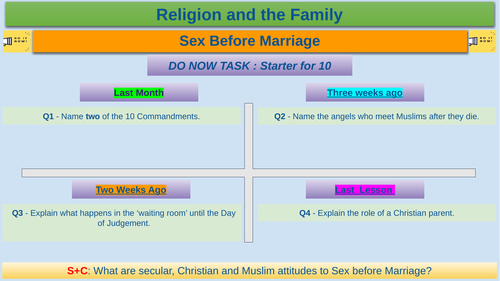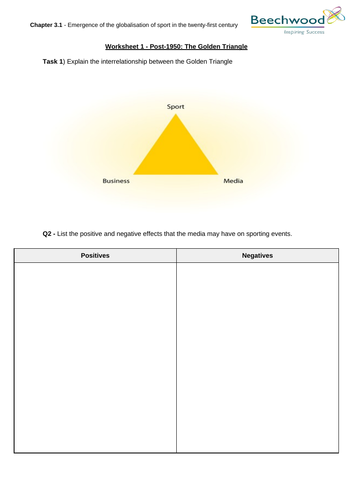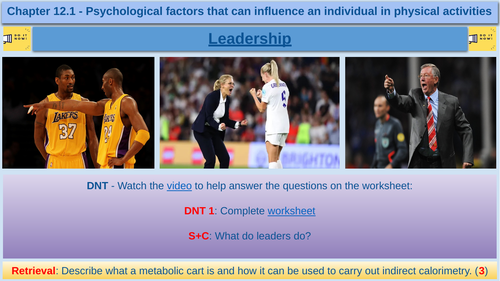
221Uploads
29k+Views
7k+Downloads
All resources

Consequences and Victims of War - AQA - Religious Studies GCSE
Resource includes PowerPoint presention and differentiated worksheets for a 1 hour lesson, following the AQA specification.
Component 2: Thematic studies
Theme D
L1 - Forgiveness and Reconciliation
L2 - Pacifism and Peacekeeping
L3 - Violent Protests
L4 - Terrorism
L5- Consequences and Victims of War
L6 - Weapons of Mass Destruction and Nuclear Weapons
L7 - Holy War and Just War
L8 - Assessment
L9 - DiRT

Lever Systems - GCSE Physical Education - AQA
Resource includes PowerPoint presention and differentiated worksheets for a 1 hour lesson, following the AQA specification.
Chapter 2 - Movement Analysis
Lesson 1 - Lever systems
Lesson 2 - Mechanical advantage
Lesson 3 - Planes and axes of movement
Lesson 4 - Movement Analysis

Fitness Testing - Part 1 - GCSE Physical Education - AQA
Resource includes PowerPoint presention and differentiated worksheets for a 1 hour lesson, following the AQA specification.
Chapter 3 - Physical Training
Lesson 1 - Relationship between health and fitness
Lesson 2 - Components of Fitness - Health Related
Lesson 3 - Components of Fitness - Skill Related
Lesson 4 - Fitness Testing - Part 1
Lesson 5 - Fitness Testing - Part 2
Lesson 6 - Use of Data
Lesson 7 - Principles of Training
Lesson 8 - Methods of Training
Lesson 9 - Training seasons and injury prevention
Practical - Physical Training Lessons

Injury Prevention - GCSE Physical Education - AQA
Resource includes PowerPoint presention and differentiated worksheets for a 1 hour lesson, following the AQA specification.
Chapter 3 - Physical Training
Lesson 1 - Relationship between health and fitness
Lesson 2 - Components of Fitness - Health Related
Lesson 3 - Components of Fitness - Skill Related
Lesson 4 - Fitness Testing - Part 1
Lesson 5 - Fitness Testing - Part 2
Lesson 6 - Use of Data
Lesson 7 - Principles of Training
Lesson 8 - Methods of Training
Lesson 9 - Training seasons and injury prevention
Practical - Physical Training Lessons

Commercialisation in Sport - Part 1 - GCSE Physical Education - AQA
Resource includes PowerPoint presention and differentiated worksheets for a 1 hour lesson, following the AQA specification.
5b - Commercialisation of physical activity and sport
Lesson 1: Commercialisation in Sport - Part 1
Lesson 2: Commercialisation in Sport - Part 2
Lesson 3: Technology in Sport

Technology in Sport - GCSE Physical Education - AQA
Resource includes PowerPoint presention and differentiated worksheets for a 1 hour lesson, following the AQA specification.
5b - Commercialisation of physical activity and sport
Lesson 1: Commercialisation in Sport - Part 1
Lesson 2: Commercialisation in Sport - Part 2
Lesson 3: Technology in Sport

Somatotypes - GCSE Physical Education - AQA
Resource includes PowerPoint presention and differentiated worksheets for a 1 hour lesson, following the AQA specification.
Chapter 6 - Health and Fitness
Lesson 1: Health, well-being and fitness
Lesson 2: Sedentary Lifestyle
Lesson 3: Somatotypes
Lesson 4: Diet and Energy Sources

The Noble Eightfold Path
KS3 Philosophy and Ethics - Unit 1- Evil and Suffering
Students will be able to:
To identify the principles of the Noble Eightfold Path
To examine the relationship between The Noble Eightfold Path and the Threefold Way
To suggest how each of the ethical principles can end suffering and ultimately help someone achieve nirvana
Feedback is welcome, please check out the rest of my lessons in the Science and Religion Scheme of Work!

Life After Death
KS3 Philosophy and Ethics - Unit 3 - Life after death?
Students will be able to:
To explore different beliefs on whether there is life after death
To analyse whether the belief in life after death affects the way believers live
To evaluate different beliefs in life after death against each other
Feedback is welcome, please check out the rest of my lessons in the Science and Religion Scheme of Work!

What is Morality?
KS3 Philosophy and Ethics - Unit 2 - Religious Laws
Students will be able to:
To define the following key terms; morality, ethics and moral issues
To examine where people get their morals from
To evaluate whether we need religious rules to do the right thing?
Feedback is welcome, please check out the rest of my lessons in the Science and Religion Scheme of Work!

Nature and Purpose of Families
KS3 Philosophy and Ethics - Unit 4 - Religion and the Family
Students will be able to:
To consider the nature of families in the 21st century.
To explore religious beliefs and teachings about the nature of families and the role of parents
To evaluate the nature and purpose of families in the 21st century.
Feedback is welcome, please check out the rest of my lessons in the Science and Religion Scheme of Work!

Sex Before Marriage
KS3 Philosophy and Ethics - Unit 4 - Religion and the Family
Students will be able to:
To consider secular attitudes towards sexual relationships before/outside marriage
To explore why sexual relationships can happen before/outside of marriage
To explain religious views towards sexual relationships before/outside marriage
Feedback is welcome, please check out the rest of my lessons in the Science and Religion Scheme of Work!

Divorce
KS3 Philosophy and Ethics - Unit 4 - Religion and the Family
Students will be able to:
To consider the different reasons for divorce in Britain today
To explore religious beliefs and teachings about divorce and remarriage
To evaluate whether it should be easy to get a divorce
Feedback is welcome, please check out the rest of my lessons in the Science and Religion Scheme of Work!

When Does Life Begin?
KS3 Philosophy and Ethics - Unit 5 - Sanctity of Life
Students will be able to:
To define the key terms related to this lesson (conception, ensoulment, sanctity of life and abortion)
To consider when life begins.
To summarise religious beliefs, teachings to the beginning of life.
Feedback is welcome, please check out the rest of my lessons in the Science and Religion Scheme of Work!

Post-1950: The Golden Triangle
Chapter 3.1 - Emergence of the globalisation of sport in the twenty-first century
Resource includes PowerPoint presention and differentiated worksheets for a 1 hour lesson, following the AQA specification.
Students will be able to:
AO1: To know interrelationship between commercialisation (including sponsorship), media (radio, TV, satellite, internet and social media) and sports and governing bodies.
AO2: To apply this knowledge to modern day sport
AO3: To evaluate the Golden Triangles impact to sport
Feedback is welcome, please check out the rest of my lessons.

Baddeley and Hitch’s working memory model
Chapter 9.1 - Information Processing
Resource includes PowerPoint presention and differentiated worksheets for a 1 hour lesson, following the AQA specification.
Students will be able to:
AO1: To describe the key features and functions of the working memory model
AO2: To apply this knowledge to sporting situations
AO3: To analyse how Baddeley and Hitch’s model allows a performer to make effective decisions
Feedback is welcome, please check out the rest of my lessons.

Achievement Motivation
Chapter 12.1 - Psychological factors that can influence an individual in physical activities
Resource includes PowerPoint presention and differentiated worksheets for a 1 hour lesson, following the AQA specification.
Students will be able to:
AO1: To describe the varying types of motivation and the key characteristics of need to achieve and need to avoid failure personality types
AO2: To apply to sporting situations
AO3: To suggest strategies to develop approach behaviour and apply examples of achievement goal theory.
Feedback is welcome, please check out the rest of my lessons.

Schema Theory
Chapter 9.1 - Information Processing
Resource includes PowerPoint presention and differentiated worksheets for a 1 hour lesson, following the AQA specification.
Students will be able to:
AO1: To describe Schmidt’s schema theory
AO2: To apply the schema theory in sporting situations
AO3: To analyse the strategies to improve information processing
Feedback is welcome, please check out the rest of my lessons.

Attribution Theory
Chapter 12.1 - Psychological factors that can influence an individual in physical activities
Resource includes PowerPoint presention and differentiated worksheets for a 1 hour lesson, following the AQA specification.
Students will be able to:
AO1: To identify the concepts of attribution theory, self-serving bias and learned helplessness
AO2: To apply these concepts to sporting situations
AO3: To suggest strategies to prevent learned helplessness from occurring
Feedback is welcome, please check out the rest of my lessons.

Leadership
Chapter 12.1 - Psychological factors that can influence an individual in physical activities
Resource includes PowerPoint presention and differentiated worksheets for a 1 hour lesson, following the AQA specification.
Students will be able to:
AO1: To identify the characteristics of effective leaders
AO2: To apply styles and theories of leadership for different sporting situations
AO3: To evaluate the style of leadership
Feedback is welcome, please check out the rest of my lessons.


